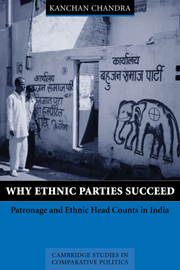Book contents
- Frontmatter
- Dedication
- Contents
- List of Maps, Figures, and Tables
- List of Abbreviations
- A Note on Terminology
- Acknowledgments
- 1 Introduction
- Part I Theory
- 2 Limited Information and Ethnic Categorization
- 3 Patronage-Democracy, Limited Information, and Ethnic Favourit
- 4 Counting Heads: Why Ethnic Parties Succeed in Patronage-Democracies
- 5 Why Parties Have Different Ethnic Head Counts: Party Organization and Elite Incorporation
- Part II Data
- Appendix A Elite Interviews
- Appendix B Ethnographies of Election Campaigns
- Appendix C Content Analysis
- Appendix D Description of Survey Data
- Appendix E Description of the Ecological Inference (EI) Method
- Appendix F Method Used to Estimate Ethnic Voting Patterns
- Bibliography
- Index
- Miscellaneous Endmatter
4 - Counting Heads: Why Ethnic Parties Succeed in Patronage-Democracies
from Part I - Theory
Published online by Cambridge University Press: 19 October 2017
- Frontmatter
- Dedication
- Contents
- List of Maps, Figures, and Tables
- List of Abbreviations
- A Note on Terminology
- Acknowledgments
- 1 Introduction
- Part I Theory
- 2 Limited Information and Ethnic Categorization
- 3 Patronage-Democracy, Limited Information, and Ethnic Favourit
- 4 Counting Heads: Why Ethnic Parties Succeed in Patronage-Democracies
- 5 Why Parties Have Different Ethnic Head Counts: Party Organization and Elite Incorporation
- Part II Data
- Appendix A Elite Interviews
- Appendix B Ethnographies of Election Campaigns
- Appendix C Content Analysis
- Appendix D Description of Survey Data
- Appendix E Description of the Ecological Inference (EI) Method
- Appendix F Method Used to Estimate Ethnic Voting Patterns
- Bibliography
- Index
- Miscellaneous Endmatter
Summary
This chapter builds upon the individual microfoundations introduced in the previous chapter to propose a hypothesis predicting ethnic party success and failure in patronage-democracies. Voters in patronage-democracies, I argue here, decide whether or not to vote for any type of party – ethnic, multiethnic, or nonethnic – based on a comprehensive process of ethnic head counting. They formulate preferences across parties by counting the heads of co-ethnics in positions of power and prestige in party organizations. They decide to vote in accordance with these preferences only when they expect their preferred party to win or to exercise influence after the election. And they formulate expectations about the probable electoral outcome by ascertaining, after counting the heads of co-ethnics and ethnic outsiders in the electorate, that members of their “own” ethnic category are numerous enough to take the party past the threshold of winning or influence. Ethnic parties are likely to succeed, therefore, only when they have a comparative advantage in the representation of elites from their target ethnic category and when members of their target ethnic category are numerous enough to affect the outcome. When either of these two conditions is not met, ethnic parties are likely to fail.
This chapter is organized as follows: Section I outlines the proposition that voters in patronage-democracies formulate preferences across political parties by counting heads belonging to their “own” ethnic category rather than by assessing party issue positions; section II outlines the proposition that these benefit-seeing voters are also strategic actors who will vote for their preferred party only if it is likely to win or to exercise influence after the election, and not otherwise; section III outlines the proposition that voters formulate expectations about the electoral outcome by counting the heads of co-ethnics across the electorate; section IV outlines the proposition that party strategy in patronage-democracies should give primary emphasis to developing advantageous systems of ethnic categorization rather than to developing advantageous issue dimensions; section V, based on these previous propositions, outlines the hypothesis predicting the success of ethnic parties; and Section VI elaborates on the paradox of ethnic party failure. The argument presented here also generates a range of additional hypotheses about elite strategy and voting behaviour in patronage-democracies. These are identified but not tested here, since they are tangential to the main subject of this study.
- Type
- Chapter
- Information
- Why Ethnic Parties SucceedPatronage and Ethnic Head Counts in India, pp. 82 - 98Publisher: Cambridge University PressPrint publication year: 2004



